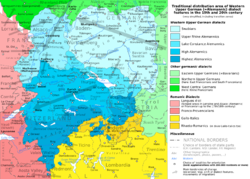Names of Germany

Germany has a long history before 1871, having different tribes and states. There are many names of Germany in different languages, more than any other European nation. For example, in the German language, the country is known as Deutschland from the Old High German diutisc, in Spanish as Alemania and in French as Allemagne from the name of the Alamanni tribe, in Italian as Germania from the Latin Germania, in Polish as Niemcy from the Protoslavic nemets, and in Finnish and Estonian as Saksa and Saksamaa respectively from the name of the Saxon tribe.
Names from Alemanni[change | change source]
The name Allemagne came from the Germanic Alemanni tribe, who lived in Alemannia (today's Alsace, parts of Baden-Württemberg and Switzerland).

In English, the name "Almain" or "Alman" was used for Germany until the 16th century. The word German was first used in 1520 as an alternative word, it then becoming a replacement word.
Names from Germania[change | change source]

The name Germany came from the Latin Germania in the 3rd century BC, it was word describing fertile land for farming behind the limes. The Gauls called the people who crossed east of the Rhine Germani but the original Germanic tribes did not call themselves that.[1]
Julius Caesar was the first to use Germanus in writing when describing people in north-eastern Gaul in his Commentarii de Bello Gallico: he records the four northern Belgic tribes: Condrusi, Eburones, Caeraesi and Paemani.
References[change | change source]
- ↑ Wolfram, Herwig (1997). The Roman Empire and its Germanic Peoples. University of California Press. pp. 4–5. ISBN 0-520-08511-6.
